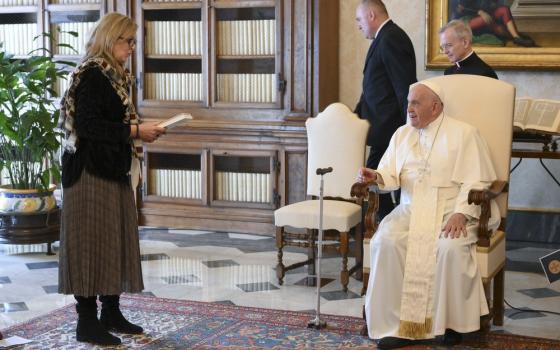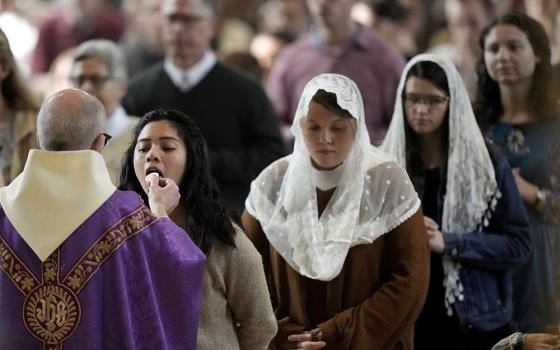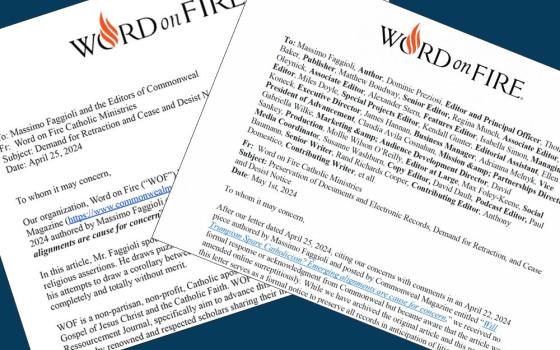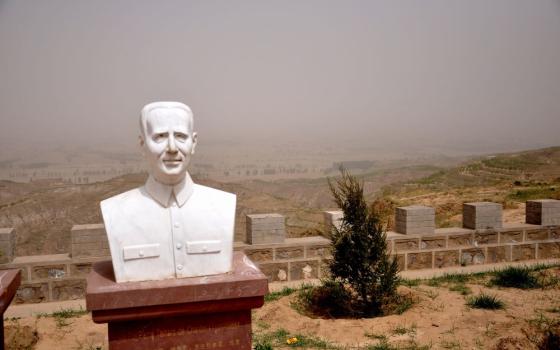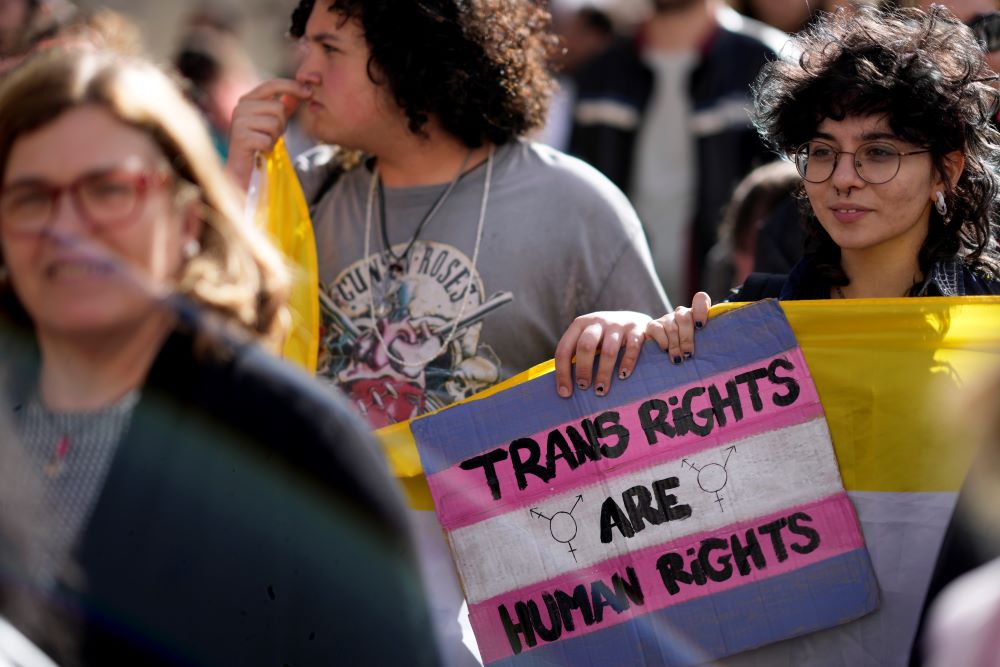
Demonstrators in Lisbon, Portugal, take part in a march to celebrate International Transgender Day of Visibility March 31. (AP/Armando Franca)
Pope Francis warmly and repeatedly interacts with transgender individuals, sanctioned a document that affirms trans people can serve as Catholic godparents, and has praised the work of LGBTQ advocacy groups previously denounced by the Vatican.
But he also recently approved a new treatise on human dignity that lists "gender theory" and gender-affirming surgeries — which many, though not all, trans people undergo — among the "grave violations of human dignity in our time," placing them alongside sexual abuse, human trafficking, poverty and abortion.
NCR asked three Catholic theologians how they view Dignitas Infinita ("Infinite Dignity"), issued by the Dicastery for the Doctrine of the Faith on April 8, in light of the pope's notable actions of welcome toward the trans community.
Their answers have points of agreement but also mirror the broader discourse in the U.S. church, where portions of the document have been met with praise, gratitude, disappointment and fear.
Does Dignitas Infinita say anything new?
The theologians agreed that the Vatican document is a rearticulation of previous church teachings on gender, but they disagreed as to whether it addresses the concrete realities of trans people, and whether further doctrinal developments are possible.
Ish Ruiz is a theologian, ethicist and postdoctoral teaching fellow at Emory University in Atlanta. He told NCR that while Dignitas Infinita contains a synthesis of past teachings, it is the first time the highest doctrinal office at the Vatican has affirmed a doctrine on "gender theory" and "sex change" surgeries.
"It elevates these ideas to a definitively magisterial doctrine on gender-affirming surgery, offering a forceful condemnation by calling it a threat to human dignity," he said.

Ish Ruiz is a queer Latino Catholic theologian, ethicist and postdoctoral teaching fellow at Emory University in Atlanta. (Courtesy of Ish Ruiz)
Ruiz, who identifies as queer, said he sees that as a problem.
"Doctrine develops over time, and I'm afraid a doctrine like this is a setback for those of us who seek to expand LGBTQ+ inclusion in the church," he said.
Quoting Amoris Laetitia, Francis' 2016 apostolic exhortation on family life, Dignitas Infinita states that gender theory "envisages a society without sexual differences, thereby eliminating the anthropological basis of the family."
This argument is "a boogeyman, a monster that is somehow threatening to destroy us, but it doesn't really exist," Ruiz said.
"Transgender persons are not trying to eliminate gender differences; they are not trying to erase the so-called foundation for the human family — not at all," he said. "They are trying to live faithfully to their God-given identity, even at the risk of oppression, and undergoing gender-affirming surgeries so they can experience the very same human dignity that is being extended to everyone else."
Ruiz contends that, because Dignitas Infinita did not consult and ultimately misrepresented the experiences of trans people, it does not represent magisterial doctrine on transgender people "as we understand them today or as they see themselves."
Dawn Eden Goldstein, a theologian, canonist and author in Washington, D.C., said the church always will teach that there are just two sexes and that "nothing is going to change with regard to the doctrine."
(Trans advocates say being transgender does not necessarily mean people have a "third gender," since most trans people identify with being either male or female after being assigned the opposite gender at birth.)
What can change, said Goldstein, is the church speaking more forcefully with regard to "how we as Catholics are to show charity to people."
Dawn Eden Goldstein is a theologian, canonist and author in Washington, D.C. (Courtesy of Dawn Eden Goldstein)
For guidance on how to respond to trans people, she said, Catholics can look to Francis, who, while affirming that there are only two sexes, "will still refer to people by their preferred pronouns — out of charity."
The recent Vatican document does not address pastoral questions around pronouns, but Goldstein said she can imagine the church saying it is not sinful to use someone's preferred name and pronoun, although with room for people to follow their conscience on the matter in a sensitive way.
In the United States, many diocesan gender policies currently prohibit the use of preferred pronouns.
Although Dignitas Infinita is a reaffirmation of traditional positions on gender, a new addition is that the Vatican does not only condemn unjust discrimination but also denounces the practice in some parts of the world to imprison and torture people because of their "sexual orientation," said Elizabeth Sweeny Block, a Catholic moral theologian and associate professor of Christian ethics at St. Louis University.
The Catechism of the Catholic Church, in a section on people who are homosexual, says "every sign of unjust discrimination in their regard should be avoided.'"
Dignitas Infinita goes further, said Block.

Elizabeth Sweeny Block, an associate professor of Christian ethics at St. Louis University, said the Eucharist should not be weaponized. (Courtesy of Elizabeth Sweeny Block)
Goldstein told NCR this stronger wording is significant given that, for instance, the Center for Family and Human Rights (C-Fam), a nongovernmental organization that claims to represent Catholic understanding on human rights at the United Nations, "supports efforts to criminalize homosexuality in places like Africa."
C-FAM is listed as an anti-LGBT hate group by the Southern Poverty Law Center, and its president, Austin Ruse, reportedly supports the criminalization of homosexuality. Ruse told NCR that neither he nor his organization have ever argued for criminalizing homosexuality.*
A group cannot say it advocates for the Catholic understanding of the human person while it backs that view, said Goldstein.
The Vatican document's firm repudiation of unjust discrimination toward every person "regardless of sexual orientation" precedes the section on "gender theory," a placement that seems to put sexual orientation and gender identity under the same umbrella. The document never uses the terms "transgender" or "gender dysphoria."
Ruiz said the conflation of sexual orientation (related to people's sexual attraction) and gender identity (one's concept of self as male, female or nonbinary) "further demonstrates a lack of familiarity with contemporary conversations about sexuality and shows a misunderstanding of different realities."
More generally, added Block, when it comes to understanding human bodies, sexuality and gender, the church has always relied on a traditional and narrow interpretation of Scripture to support the claims it wishes to uphold, instead of learning from other disciplines, including science.
She contrasted that approach with how Francis went to great lengths in his latest apostolic exhortation on the climate crisis, Laudate Deum, to provide scientific evidence of climate change.
"A continued openness to varied sources of wisdom is critical," Block said.
Pastoral vs. doctrinal?
Last fall, Cardinal Víctor Manuel Fernández, head of the Vatican's doctrine office, said in a written response to questions from a Brazilian bishop that transgender people may be baptized, serve as godparents and be witnesses at Catholic weddings, if it would not cause confusion or "public scandal" among fellow Catholics.
Fernández said this would apply even to "transsexuals" (the term used in the 2023 document, written in Italian, and considered outdated by some trans advocates) who have undergone gender reassignment surgery and hormone treatment.
Goldstein — who is concerned people are focused far more on gender identity issues in Dignitas Infinita than on its striking, important statements on the death penalty, war and other issues — said the new 2024 document is doctrinal and Fernández's answers are pastoral.
"Doctrine informs our pastoral understanding, but pastoral ministry also takes up questions that aren't taken up by doctrine," she said. "Sometimes charity will require us to do things that require a kind of broadness that we couldn't exercise if we were teaching the doctrine."
Because a person with gender dysphoria may experience "psychological issues that cause them to feel pain in their biological sex," Goldstein said, that may "mitigate their culpability" in choosing to undergo surgery.
Advertisement
However, Dignitas Infinita buttresses arguments for conscience protections for doctors, said Goldstein. "It is certainly saying that Catholic doctors can't participate in operations to change the way that their sex appears," she said.
For Ruiz, the pastoral and the doctrinal documents together "show an inconsistency."
"The idea that transgender persons should be treated with respect and welcome, but at the same time we are going to consider their queerness, their trans identities and the way they live those out as a threat to human dignity — there's a disconnect there," he said.
"At the end of the day, it's a question of integrity," said Ruiz. "These matters of human sexuality are incredibly mysterious, and we're still trying to understand them. We have to be honest about that instead of feigning certainty when we are still learning."
*Editor's Note: This article was updated after initial publication to include a comment from Austin Ruse, president of C-Fam.






